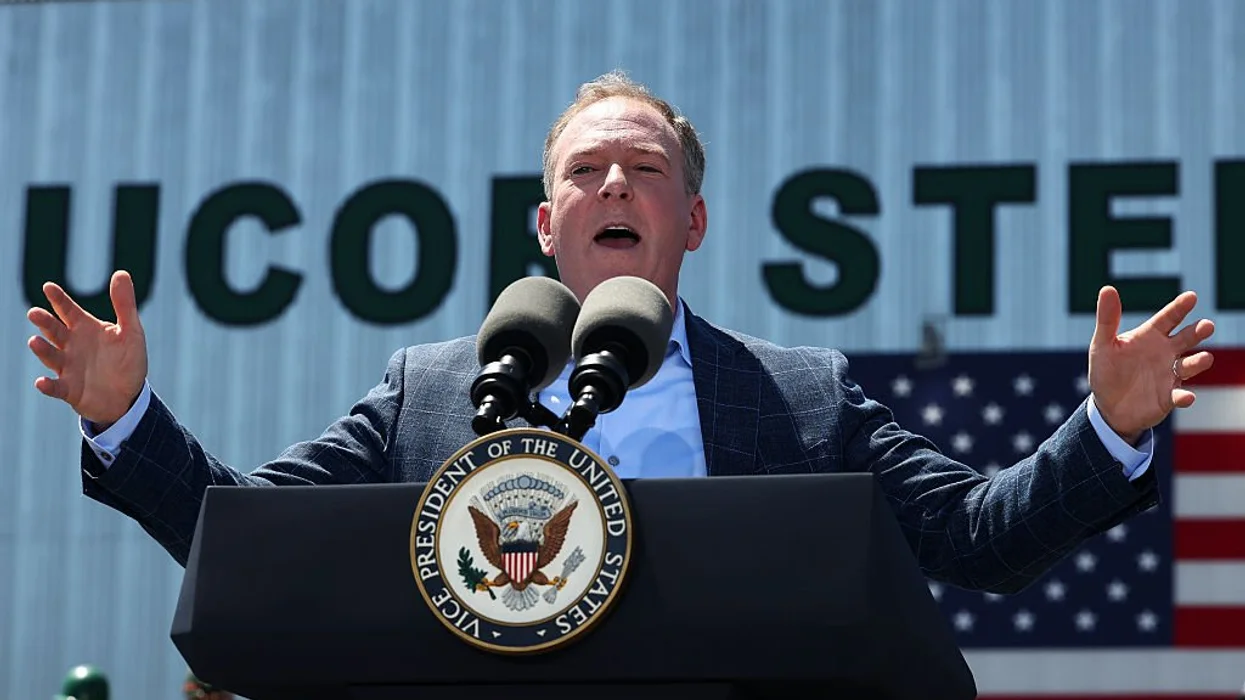
© 2025 Blaze Media LLC. All rights reserved.

WASHINGTON (The Blaze/AP) -- Just as the tides of extremism seem to be potentially turning in Kuwait, news is breaking that the United States is planning a significant military presence of 13,500 troops in the Middle Eastern nation. According to a congressional report, the reported action is being taken to give the U.S. the flexibility needed to respond to sudden conflicts in the region as Iraq adjusts to the withdrawal of American combat forces and the world nervously eyes Iran.
(Related: Man Gets 10 Years in Kuwaiti Prison for Allegedly Sending Anti-Prophet Mohammad Tweets)
The study by the Senate Foreign Relations Committee examined the U.S. relationship with the six nations of the Gulf Cooperation Council -- Saudi Arabia, Kuwait, Bahrain, Qatar, the United Arab Emirates and Oman -- against a fast-moving backdrop. In just the last two days, Saudi Arabia's ruler named Defense Minister Prince Salman bin Abdul-Aziz as the country's new crown prince after last week's death of Prince Nayef, and Kuwait's government suspended parliament meetings for a month over an internal political feud.
The political showdown in Kuwait occurred over an escalating feud with Islamist-led opposition lawmakers seeking a greater voice in the Gulf nation's affairs. The suspension follows the resignations of two Cabinet ministers in less than a month under pressure from the opposition bloc, which includes conservative Islamist figures and their allies pushing for a larger share of seats in the government controlled by Kuwait's Western-backed ruling family.
It's unclear whether the parliament suspension could be a step toward a full-scale government resignation and new elections. It reflects the deep frustration by the country's rulers at the political stalemate, which has diverted attention from economic development proposals and other issues, such as simmering labor unrest in OPEC's fourth-largest oil exporter.
Kuwait has the Gulf's most politically independent parliament. It often demands to question top officials and has the ability to pass no-confidence votes to oust Cabinet officials. Tensions have flared since February elections that gave Islamists and their political backers control of the chamber.
The opposition insists they now deserve more than half the seats in the 15-member Cabinet. The bloc rejected an offer of four seats after the election. The official Kuwait News Agency said the Cabinet approved an order by the country's ruler to suspend parliament sessions for a month. That extends into the holy month of Ramadan, an official holiday when parliament is typically shut down.
The latest developments inject even more uncertainty as the Middle East deals with the demands of the Arab Spring, the end to U.S. combat operations in Iraq at the end of 2011, fears of Iran's nuclear program and the counterterrorism campaign.
"Home to more than half of the world's oil reserves and over a third of its natural gas, the stability of the Persian Gulf is critical to the global economy," the report said. "However, the region faces a myriad of political and security challenges, from the Iranian nuclear program to the threat of terrorism to the political crisis in Bahrain."
The report, obtained by The Associated Press in advance of Tuesday's release, provided precise numbers on U.S. forces in Kuwait, a presence that Pentagon officials have only acknowledged on condition of anonymity. Currently, there are about 15,000 U.S. forces in Kuwait at Camp Arifjan, Ali Al Salem Air Base and Camp Buehring, giving the United States staging hubs, training ranges and locations to provide logistical support. The report said the number of troops is likely to drop to 13,500.
Several members of Congress, most notably Sens. John McCain, R-Ariz., and Lindsey Graham, R-S.C., had pressed for a residual U.S. force to remain in Iraq, but the failure of the two countries to agree on whether American troops should be granted legal immunity scuttled that idea. Instead, officials talked of positioning a strong U.S. force just across the border in Kuwait. The strategy preserves "lily pad" basing that allows the military to move quickly from one location to the next.
As it recalibrates its national security strategy, the United States is drawing down forces in Europe while focusing on other regions, such as the Middle East and Asia. Defense Secretary Leon Panetta has said he envisions about 40,000 troops stationed in the Middle East region after the withdrawal from Iraq. By comparison, a cut of two Army combat brigades and the withdrawal of two other smaller units will leave about 68,000 troops in Europe.

During the 1991 Persian Gulf War, some half a million U.S. forces were in the Middle East region. The United States maintained about 5,000 troops in Kuwait from the end of the Gulf War to March 2003, when U.S. and coalition forces invaded Iraq to topple the regime of Saddam Hussein. The U.S.-led invasion was in response to reports, later discredited, that Iraq was developing weapons of mass destruction.
Senate Foreign Relations Committee Chairman John Kerry, D-Mass., who asked his staff to conduct the study, said in a statement: "This is a period of historic, but turbulent change in the Middle East. We need to be clear-eyed about what these interests are and how best to promote them. This report provides a thoughtful set of recommendations designed to do exactly that."
The 37-page report raises questions about how the United States can leverage its financial aid to force change in the Middle East. Late last year, two Democrats - Sen. Ron Wyden of Oregon and Rep. Jim McGovern of Massachusetts - opposed the U.S. sale of spare parts and equipment to Bahrain, arguing that the ruling Sunni monarchy was violating human rights and using excessive force to crack down on protests. The State Department went ahead earlier this year with the sale of some military equipment, saying it was for Bahrain's external defense and support for the U.S. Navy's 5th Fleet, which is based in the country.
Bahrain stands as a strategic ally to counter Iran.

The report said the Unites States "should not be quick to rescind security assurances or assistance in response to human rights abuses but should evaluate each case on its own merits. U.S. government officials should use these tools to advance human rights through careful diplomacy ... The United States should make clear that states must not use arms procured from the United States against their own people engaged in peaceful assembly or exploit the U.S. security umbrella as protection for belligerent action against their neighbors."
The report also recommended that the United States promote the development of the Gulf Cooperation Council and the Arab League while strengthening bilateral links to the six countries; seek opportunities for burden-sharing on operations such as missile defense, combat air patrol and maritime security; and push for the integration of Iraq into the Arab fold.
The report emphasized that the region is critical as a counterbalance to Iran, whose conventional military includes 350,000 ground forces, 1,800 tanks and more than 300 fighter aircraft. It also has ballistic missiles with the range to target regional allies, including Israel.
Want to leave a tip?
We answer to you. Help keep our content free of advertisers and big tech censorship by leaving a tip today.
Want to join the conversation?
Already a subscriber?
Billy Hallowell is a digital TV host and interviewer for Faithwire and CBN News and the co-host of CBN’s "Quick Start Podcast."
Billy Hallowell
Billy Hallowell is a digital TV host and interviewer for Faithwire and CBN News and the co-host of CBN’s "Quick Start Podcast."
more stories
Sign up for the Blaze newsletter
By signing up, you agree to our Privacy Policy and Terms of Use, and agree to receive content that may sometimes include advertisements. You may opt out at any time.
Related Content
© 2025 Blaze Media LLC. All rights reserved.
Get the stories that matter most delivered directly to your inbox.
By signing up, you agree to our Privacy Policy and Terms of Use, and agree to receive content that may sometimes include advertisements. You may opt out at any time.







